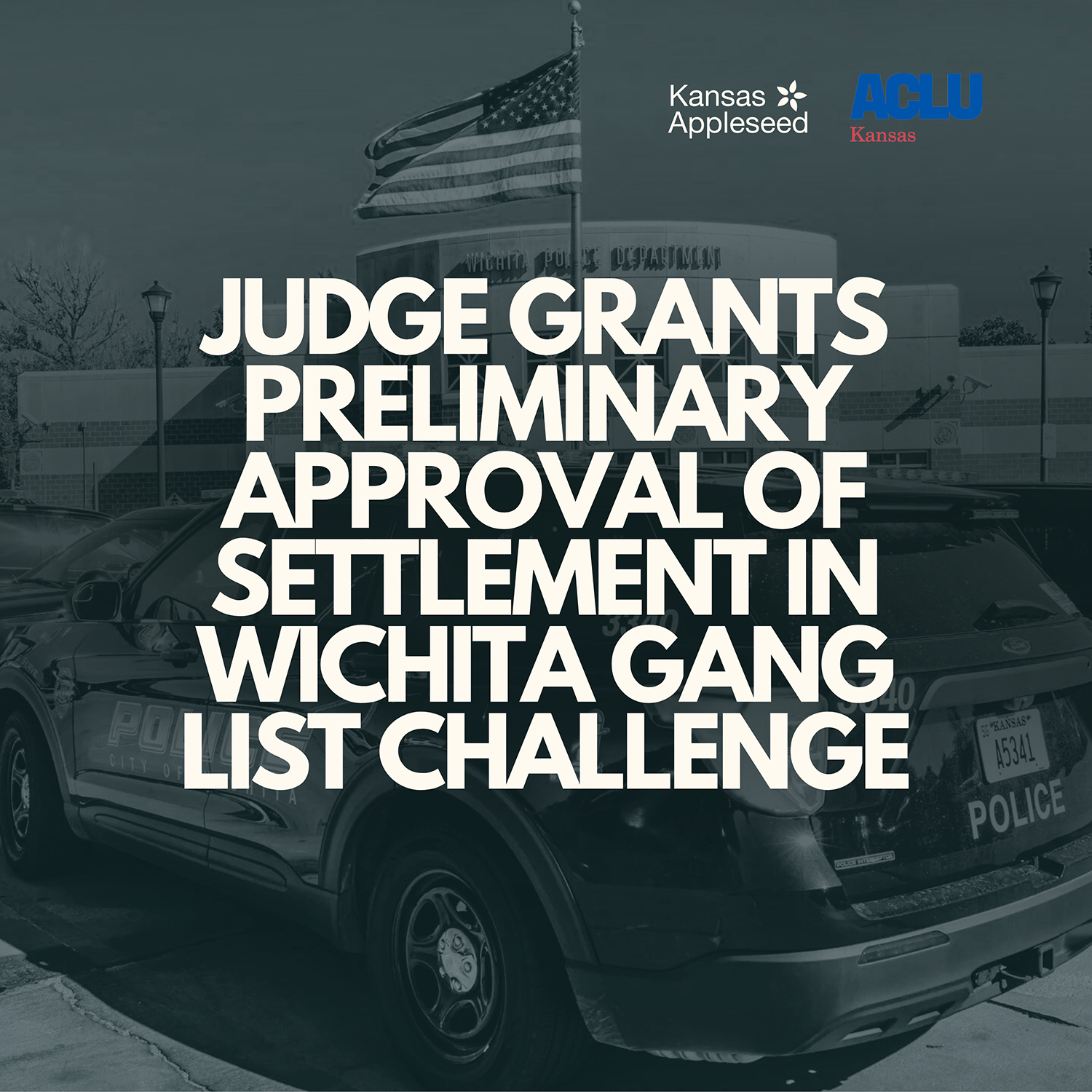Wichita Gang List Settlement: Changes & Your Rights | [2024 Updates]
Is it possible for a simple game of basketball or a casual visit to a gas station to land you on a police list, effectively painting you as a potential criminal? In Wichita, Kansas, for decades, this chilling reality has been the case, as the Wichita Police Department (WPD) maintained a controversial "gang list" that cast a wide net, ensnaring individuals based on flimsy pretexts and disproportionately targeting minority communities.
The city of Wichita has been grappling with the fallout of this practice, a practice that has finally seen a significant legal challenge reach a critical juncture. On August 26, 2024, the court granted final approval to a settlement in a class action lawsuit, marking a pivotal moment in the fight for civil rights and against discriminatory policing in the city. This settlement represents a hard-fought victory for those who have been wrongly labeled and subjected to increased scrutiny and potential legal repercussions.
The core issue revolved around the WPD's "gang list," an internal document used to identify individuals suspected of gang involvement. The list, compiled over approximately 30 years, has been the subject of intense criticism from civil rights groups and community activists who argue that it violates the constitutional rights of those included. The primary concerns center on the criteria used for inclusion, the lack of due process for those listed, and the disproportionate impact on Black and Latino residents.
- Cristin De La Fuente Net Worth How Rich Is The Chilean Actor
- Discover Movies Showtimes In Lebanon Your Guide
The settlement, approved in the case of Progeny v. City of Wichita, addresses several key aspects of the problematic gang list. One of the most significant outcomes is the removal of 3,517 individuals previously classified as "inactive gang members" and "gang associates" from the list. This measure aims to correct the injustice of labeling individuals based on tenuous connections or outdated information.
| Subject | Wichita Police Department's "Gang List" |
| Description | An internal document maintained by the Wichita Police Department (WPD) used to identify individuals suspected of gang involvement or association. |
| Purpose (as intended by WPD) | To assist in investigations, surveillance, and the prevention of gang-related crime. |
| Criticisms |
|
| Population Demographics Impacted: |
|
| Settlement Outcome |
|
| Primary Legal Challenges |
|
| Key Organizations Involved |
|
| Reference Link | ACLU of Kansas |
The implications of being on the WPD's gang list extended beyond mere identification. Individuals on the list faced increased scrutiny from law enforcement, including a higher likelihood of being stopped, searched, and questioned. This heightened surveillance created a climate of fear and mistrust, particularly for those in marginalized communities. Community activists decried the practice of labeling individuals as gang members based on what they considered "snap judgements" and without concrete evidence of criminal activity.
The lawsuit, filed in 2021 by the juvenile justice group Progeny, along with the ACLU of Kansas and Kansas Appleseed, challenged the discriminatory and unconstitutional nature of the gang list. The plaintiffs argued that the list violated the Fourteenth Amendment's guarantee of equal protection under the law and the First Amendment's protections of freedom of association. The legal challenge highlighted the disproportionate impact of the list on Black and Latino residents, who were overrepresented on the list compared to their representation in the city's overall population. Data from 2022 indicated that more than half of the individuals on the list were Black, nearly 30% were Latino, and around 6% were white, while the city's population was predominantly white. These figures underscore the systemic biases embedded within the gang list and its implementation.
- Discover Iconic Canadian Female Singers In Music History
- Fallen Angels 1995 Where To Watch Best Deals
The settlement agreement mandates that the city of Wichita implement significant reforms to its gang list policy. These reforms include providing mechanisms for individuals to check their status on the list and to appeal their inclusion. This provision ensures that individuals have the opportunity to challenge their designation and to clear their names if they were wrongly included. The settlement also requires the city to adopt clearer and more objective criteria for inclusion on the list, reducing the likelihood of arbitrary or discriminatory designations.
The financial settlement of $625,000 represents a recognition of the harm caused by the WPD's practices. This sum will be used to compensate those affected by the discriminatory and unconstitutional use of the gang list and to fund programs aimed at repairing the damage to the affected communities. The settlement underscores the importance of holding law enforcement accountable for its actions and ensuring that its practices align with the principles of justice and equality.
The lawsuit cited a pattern of using factors such as "attending funerals, weddings, family celebrations, public venues, public gatherings like concerts" as reasons to add or keep people on the list, according to Kunyu Ching, a staff attorney with the ACLU of Kansas. Teresa Woody, the litigation director at Kansas Appleseed, highlighted the "severe discrimination in the gang list" and its overwhelmingly targeting of Black and Brown communities. The organizations that brought the suit on behalf of progeny, a juvenile justice group, also involved several individuals who had been included on the list.
The approval of the settlement on August 26, 2024, marks a crucial step toward addressing the systemic issues that have plagued the Wichita Police Department's gang list. The reforms mandated by the settlement, including the removal of thousands of names, the implementation of clearer criteria, and the provision of an appeals process, aim to rectify the past injustices and prevent future abuses. This is a victory for the affected communities and a significant step forward in the pursuit of fair and equitable policing in Wichita.
The legacy of the WPD's gang list serves as a stark reminder of the potential for unchecked power within law enforcement to erode civil liberties and disproportionately impact marginalized communities. The settlement is a testament to the power of community activism, legal advocacy, and the unwavering commitment to justice. It signifies a commitment to ensuring the protection of the rights of all residents, regardless of their race or background. This landmark case has the potential to serve as a template for other cities grappling with similar issues, providing guidance on how to reform discriminatory practices and build more equitable relationships between law enforcement and the communities they serve.
The implementation of these reforms is a critical step. The city of Wichita must now diligently work to implement the mechanisms and processes as outlined in the settlement agreement, providing transparency and ensuring that individuals have the ability to challenge their inclusion and to seek recourse if they believe they have been wrongly targeted. This commitment to reform and accountability is essential for restoring trust and fostering a more just and equitable community.
The court decision also sends a strong message: the old ways of policing, where individuals are judged based on association and superficial observations, are no longer acceptable. Law enforcement agencies must adopt objective criteria, provide due process, and eliminate any practices that contribute to racial and ethnic disparities. The settlement agreement represents a major victory for those who have fought for years to dismantle the problematic gang list and to ensure fairness for all residents of Wichita.
The city must address the deep-seated issues that gave rise to the controversial gang list. This is not merely a matter of removing names from a database; it requires a fundamental shift in policing practices, a commitment to community engagement, and a willingness to address the historical injustices that have created distrust and division. This process will take time and dedication, but the final approval of the settlement is a crucial first step towards a more equitable and just Wichita.
The settlement is a significant victory for civil rights, but the fight for justice and fairness doesn't end here. It is essential that the WPD and the city of Wichita continue to be transparent and accountable in their efforts to reform policing practices. Community members must remain vigilant, advocating for change and ensuring that the spirit and intent of the settlement agreement are fully realized. Only through sustained effort and collaboration can Wichita create a police department that truly serves and protects all of its residents.


Detail Author:
- Name : Osbaldo Aufderhar V
- Username : borer.trace
- Email : pmurray@braun.org
- Birthdate : 1980-05-10
- Address : 2574 Jalon Loop Littleview, AR 57111-1905
- Phone : +1-689-396-0057
- Company : McCullough-Schaden
- Job : Visual Designer
- Bio : Rerum quia est expedita voluptatem veritatis. Perspiciatis ducimus odio repudiandae possimus architecto. Enim unde fugit non id.
Socials
facebook:
- url : https://facebook.com/runolfsson1972
- username : runolfsson1972
- bio : Harum alias rerum aspernatur ipsum velit sequi.
- followers : 731
- following : 958
linkedin:
- url : https://linkedin.com/in/jarrett.runolfsson
- username : jarrett.runolfsson
- bio : Aliquam doloremque est animi voluptas.
- followers : 4916
- following : 2882
twitter:
- url : https://twitter.com/jarrett_runolfsson
- username : jarrett_runolfsson
- bio : Sed cumque cumque iusto velit aut ullam. Debitis aut esse minima molestiae. Quia id qui quo ipsa quasi.
- followers : 3171
- following : 2239
tiktok:
- url : https://tiktok.com/@jarrett3559
- username : jarrett3559
- bio : Ut sint sequi quis molestias.
- followers : 2612
- following : 2933
instagram:
- url : https://instagram.com/jarrettrunolfsson
- username : jarrettrunolfsson
- bio : Quis amet ipsum molestias in. Facilis eius sit ipsam sit aliquam.
- followers : 4115
- following : 458